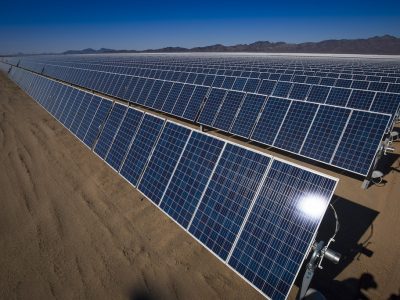Major League Soccer’s LAFC Has a Big Oil Problem Too
The Dodgers are not the only LA sports team sullying their brand by taking oil money. Beloved soccer club LAFC recently renewed a partnership with Chevron.

BMO Stadium, the home of Los Angeles Football Club, is revered as one of the best places to watch soccer in the U.S., thanks to forward-thinking design and good vibes among their famously devout fans. BMO has even been called the future of stadium design.
So, it’s all the more jarring that LAFC allows Big Oil advertising to flash behind their big plays. Like on May 11 when Denis Bouanga tied a team record with three assists in a single game thanks to a gorgeous pass to Mati Bogusz. On the sideline chyron, the brilliant blue backdrop to the play was an ad for Chevron. Sadly, there’s nothing forward-thinking about an oil and gas sponsorship.
UCLA Emmett Institute executive director Cara Horowitz recently wrote here about the Dodgers’ long relationship with 76 and asked why in 2024, is LA’s most famous team elevating a Big Oil brand atop their scoreboards? A week after her Legal Planet piece, the Los Angeles Times published a deeply reported column that quotes her and makes the case that it’s time for Dodgers owner Mark Walter to cut the team’s ties to Big Oil.
Same goes for LA’s soccer heroes. Unlike the boys in blue, LAFC is relatively new and still growing their fan base. So LAFC could actually head off this Big Oil problem now and not go decades with such a stain. The managing owners of LAFC are Brandon Beck, Larry Berg, and Bennett Rosenthal, but the club has a range of influential owners with a minority stake, such as Will Ferrell and Magic Johnson.
It was just this February that LAFC signed a three-year extension with Chevron to be the team’s “official energy partner.” That deal allows Chevron to “continue to showcase its community commitment” by helping the team refurbish school sports fields and donate equipment. “Since 2018 we have worked together with Chevron to be a ‘Force for Good’ in our region by providing resources and opportunities for youth soccer players,” LAFC Co-President & CBO Larry Freedman said in a press release. “Chevron shares LAFC’s goal of elevating our community through the world’s game, and we look forward to continuing to support and inspire others through our work together.”
Put another way, this sponsorship deal allows Chevron to look good and soak up the reputational benefits of being linked to a hot, young sports club in a sleek, new venue all while helping local schools (a good deed, to be sure).
Let’s remember that Chevron is one of the largest corporations in the world, the second largest oil company in the U.S., and the biggest based in California. In 2023, the state of California sued Chevron and several other oil companies for allegedly deceiving the public for decades about the disastrous climate impacts of their product. Chevron has also been criticized by environmental organizations for overstating its green credentials and “net zero” commitments. In fact, the California attorney general’s lawsuit states that “Chevron’s minimal efforts in the area of renewable and lower-carbon energy, coupled with its expansion of its fossil fuel business, belie its statements suggesting that it is part of the climate change solution.”
LAFC and the Dodgers are hardly the only teams participating in so-called “sportswashing.” A report by the New Weather Institute found 258 prominent deals globally across more than ten professional sports in 2021, leading them to declare that “sport is floating on a sea of high carbon sponsorship.” That report found that the most “high-carbon sponsorships” are indeed associated with football — and not the American kind. Among these sponsors, car companies and airlines were the most prominent, but oil and gas were active advertisers too. Look at the International Cricket Council, which is sponsored by Saudi Aramco, and promises to help the world’s largest oil company reach a “younger audience,” according to this recent press release. That’s disturbing given that cricket is hugely popular in India, Pakistan, and other countries that are especially vulnerable to the heat, flooding, and drought exacerbated by the climate impacts of burning of fossil fuels. Chevron and Aramco even sponsor a sporting event together: the Chevron Houston Marathon and Aramco Houston Half Marathon, which promotes healthy living and charity.
Why does all this matter? Well, sponsoring sports is an effective and subtle way for Big Oil to reach audiences through the soft power of advertising. Research shows that when companies sponsor sporting events, their brands become inextricably bound with “intense experiences of shared emotion.” Repetitive exposure to this advertising means that audiences start to associate a logo or brand with the good vibes of cheering on LAFC, Dodgers—pick your team, really. For example, when the Dodgers recently trounced the Texas Rangers 15-2, the crowd was on its feet cheering every home run, filming videos on their phones, and gazing ecstatically at the scoreboard’s giant 76 sign.
 It’s an underhanded way of granting legitimacy to Big Oil brands that are past their prime. Take it from Sammy Roth, climate columnist at the Los Angeles Times and a huge Dodger fan himself. “It’s sneaky,” Roth writes in his recent column. “I make a living reporting on global warming, and even I rarely consider that every time I post a photo of the glorious Dodger Stadium skyline on social media, I’m inadvertently promoting fossil fuels — and thus a future of ever-worsening wildfires, floods, droughts and sea level rise, not to mention regular old air pollution that kills millions of people every year.” Much has been made (for good reason) of the fact that energy companies sponsor some of the very journalism that covers the oil industry, including newsletters and podcasts. But many more people will see the 76 signs in Dodger Stadium or the Chevron logo in BMO Stadium than will ever see the top of an email newsletter.
It’s an underhanded way of granting legitimacy to Big Oil brands that are past their prime. Take it from Sammy Roth, climate columnist at the Los Angeles Times and a huge Dodger fan himself. “It’s sneaky,” Roth writes in his recent column. “I make a living reporting on global warming, and even I rarely consider that every time I post a photo of the glorious Dodger Stadium skyline on social media, I’m inadvertently promoting fossil fuels — and thus a future of ever-worsening wildfires, floods, droughts and sea level rise, not to mention regular old air pollution that kills millions of people every year.” Much has been made (for good reason) of the fact that energy companies sponsor some of the very journalism that covers the oil industry, including newsletters and podcasts. But many more people will see the 76 signs in Dodger Stadium or the Chevron logo in BMO Stadium than will ever see the top of an email newsletter.
That’s why as Los Angeles prepares to host the 2028 Olympics—with all the money, branding, and attention that comes with such a spectacle—now is a good time for the owners of LAFC and the Dodgers to reconsider their association with oil and gas companies. Not to mention that if LA elected officials took action, they could join the likes of Edinburgh, Amsterdam, and Sydney, which have all cracked down on ads for fossil fuels and high-carbon products.
Corporate sponsorships will go on, of course. But there’s a big difference between LA’s most popular sports clubs teaming up with Big Oil and, say, toothpaste brands. What kind of message does it send that the stadium of the future’s official energy partner is an oil company? Just imagine what kind of message it could send if the official energy partners of these LA teams dealt with sun, wind, or geothermal energy instead.







Reader Comments